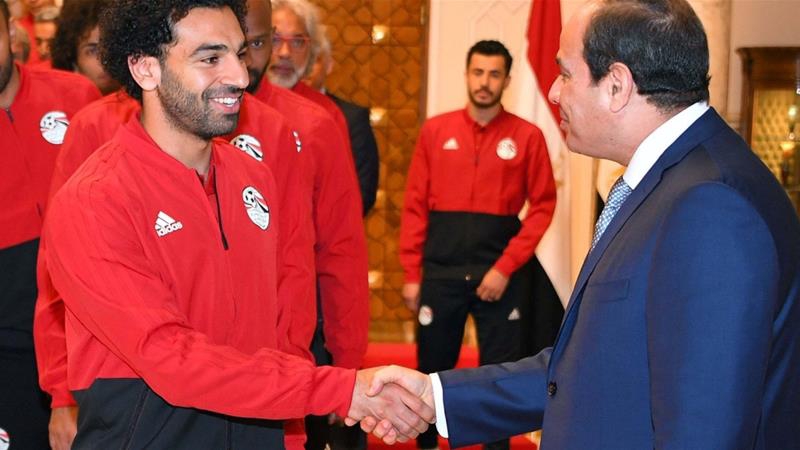
Fresh off a massively disappointing performance at the 2018 World Cup, the president of the Egyptian Football Association (EFA), Hany Abo Rida, deflected criticism of his team's woeful play by casting blame on the Muslim Brotherhood. The Pharaohs lost all three of their matches in a group widely thought to have offered Egypt a serious chance to advance to the knockout stage of the tournament.
In his comments to al-Watan newspaper, Abo Rida neglected to specify how the banned Islamist organisation contributed to Egypt's 3-1 loss to Russia or how it conspired to squander the lead in the 2-1 defeat to perpetual World Cup laughingstock Saudi Arabia in the group's final match.
Since Abdel Fattah el-Sisi, the former head of Egypt's armed forces, took power in a military coup five years ago, an inability to stabilise the country and a series of policy failures have necessitated a frequent turn towards hypernationalism. If anything, Abo Rida's farcical response to his team's disappointing performance is consistent with the Sisi regime's practice of blaming its political foes for every failure.
Shortly after their team's final defeat in Russia, Egyptians quietly commemorated the five-year anniversary of the violent end to a revolutionary moment ushered in by the 2011 popular overthrow of former President Hosni Mubarak. Backed by mass protests, el-Sisi led a military coup in July 2013 that expelled the Muslim Brotherhood-led government, formed in 2012 after free elections.
The subsequent crackdown saw mass killings, the imprisonment of tens of thousands of civilians and the forced disappearances of hundreds. Egypt's economic situation has only deteriorated further since the coup, amid widespread corruption, the lifting of crucial subsidies, and massive inflation.
Press freedom and the right for civil society activists to voice opposition has been virtually extinguished. Laws were even passed to ban the activities of football club supporters, now deemed to be terrorist groups.
Mohamed Aboutrika, the legendary player and winner of two African Cup of Nations titles with Egypt, became one of el-Sisi's high-profile targets. Regime officials seized Aboutrika's assets and added him to its terrorist list for his alleged support of the Muslim Brotherhood.
Amid the unbearable economic crisis and continuing repression, the qualification of the Egyptian team for the World Cup for the first time since 1990 was a rare opportunity for nationwide joy. Predictably, el-Sisi sought to exploit the team's appearance on a global stage to bolster support for the government.
El-Sisi and Mo Salah's success
Earlier this year, in a blatant violation of FIFA statutes regarding the politicisation of football associations, the Egypt Football Association (EFA) held a press event to offer its endorsement of el-Sisi in an election that was expected to be little more than a coronation.
Along with Abo Rida, the press conference included fawning praise and pledges of fealty for el-Sisi by the heads of some of Egypt's most important football clubs. By the time of the elections in late March, el-Sisi had arrested, intimidated or otherwise disqualified all possible challengers save one whose glowing endorsement el-Sisi had already received.
The emergence of Liverpool FC forward Mohamed Salah as a global superstar also presented an opportunity for the propagandistic aims of Egypt's emerging dictatorship. Salah had an outstanding, record-breaking year for his club and won universal acclaim as the English Premier League's Player of the Season.
The 26-year-old was also immortalised in the pantheon of great Egyptian national team players following his dramatic 94th-minute penalty that sealed Egypt's qualification for the World Cup in a tight 2-1 victory over Congo last October.
As Salah's face adorned the side of an EgyptAir aircraft, the player protested the unauthorised use of his image as "extremely insulting" in a rare public criticism of state officials.
Then, not long after the team arrived in Russia, reports emerged that Salah was privately expressing his frustrations with the poor management of the squad's World Cup campaign that included, among other things, far greater emphasis on staged publicity events than proper training and match preparation.
Salah was particularly frustrated at being used as a political pawn by the EFA as it attempted to make inroads with Ramzan Kadyrov, the authoritarian ruler of Chechnya, which served as the Egyptian team's base during the tournament.
In images that went viral on social media, Salah was paraded by Kadyrov and even granted honorary Chechen citizenship. Owing to these frustrations, and the team's ultimately dismal performance, reports surfaced after Egypt's exit from the tournament that Salah was considering international retirement
Comments